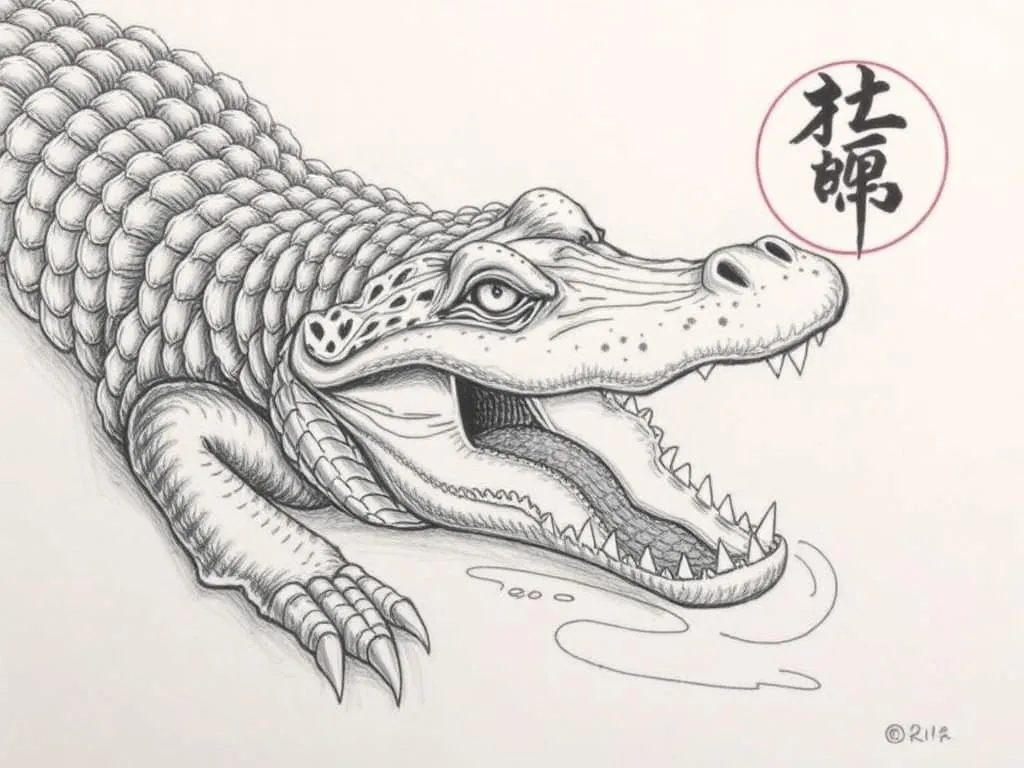The Chinese Alligator: A Symbol of Strength and Resilience

Disclaimer: Some images on this website are AI-generated artworks and may not accurately represent real animals.
The Chinese alligator (Alligator sinensis) is not merely a creature of the swamp; it is a profound symbol deeply woven into the cultural fabric of China. This article delves into the symbolism and meaning of the Chinese alligator, exploring its scientific background, cultural significance, and the various interpretations it holds in dreams and modern contexts.
Understanding the Chinese Alligator
Scientific Background
The Chinese alligator is a small species of alligator native to the Yangtze River basin in China. Unlike its larger American counterpart, the Chinese alligator typically measures around 2 to 2.5 meters in length. Its physical characteristics include:
| Physical Characteristics | Details |
|---|---|
| Length | 2 – 2.5 meters |
| Weight | Up to 70 kg |
| Skin Color | Dark olive or black |
| Habitat | Freshwater marshes, lakes, and rivers |
| Diet | Carnivorous; fish, birds, and small mammals |
The Chinese alligator is known for its relatively docile nature, which is a sharp contrast to the fierce reputation of alligators in general. Its habitat has diminished significantly due to human activities, leading to its classification as critically endangered. Despite these challenges, the Chinese alligator has adapted to its environment, showcasing remarkable resilience.
Cultural Significance
Historically, the Chinese alligator has occupied a unique place in Chinese mythology and folklore. Ancient texts and artworks often depict alligators as formidable creatures, representing strength and ferocity. In Chinese culture, they are frequently associated with water, which is a vital element for life and sustenance.
In folklore, the alligator is often seen as a guardian of water bodies, symbolizing the balance between strength and serenity. This duality contributes to its status as a potent symbol in various cultural narratives, embodying themes of protection, survival, and resilience.

Symbolism & Spiritual Meaning
Strength and Power
The Chinese alligator embodies physical and emotional strength. Its robust build and predatory instincts make it a symbol of power in Chinese culture. In many traditional stories, the alligator’s prowess in securing its survival in harsh environments reflects the inner strength required to overcome life’s challenges.
This idea extends beyond mere physicality; it encapsulates the emotional fortitude necessary to navigate the complexities of life. As a symbol, the alligator encourages individuals to harness their strength and confront obstacles with resilience.
Adaptability and Survival
The adaptability of the Chinese alligator is a significant aspect of its symbolism. Found in various habitats—from freshwater lakes to marshes—this alligator exemplifies the ability to thrive despite changing conditions. This adaptability serves as a powerful metaphor for human resilience.
In times of adversity, the Chinese alligator reminds us that survival often requires flexibility and the ability to adjust to new circumstances. This message resonates particularly in today’s fast-paced world, where change is the only constant.
Protection and Guardianship
In Chinese culture, the Chinese alligator is often viewed as a protective figure. It is believed that these creatures safeguard families and communities, particularly in relation to water resources. The alligator’s association with protection extends to its role in various cultural artifacts, where it is depicted as a guardian spirit.
This symbolism serves to reinforce the importance of community and familial bonds. By embodying the principles of guardianship, the alligator fosters a sense of security and safety, reminding individuals of the collective strength found in unity.
The Chinese Alligator in Dreams
Interpretation of Alligator Dreams
Dreams featuring the Chinese alligator can carry profound meanings. Such dreams often reflect underlying emotions and personal challenges. Here are some common themes associated with alligator dreams:
| Dream Theme | Meaning |
|---|---|
| Encountering an alligator | Facing fears or challenges |
| Swimming with an alligator | Navigating emotional depths |
| Fighting an alligator | Confronting inner conflicts |
| Observing an alligator | Gaining insight into personal strength |
These interpretations suggest that the Chinese alligator in dreams serves as a mirror to the dreamer’s internal struggles and aspirations.
Emotional Connections
Dreams involving the Chinese alligator often evoke strong emotional responses. The presence of an alligator can symbolize the dreamer’s resilience in facing life’s adversities. It may also indicate the need to confront fears that have been lurking beneath the surface.
For many, these dreams provide an opportunity for personal reflection and growth. By analyzing the emotions associated with the alligator, individuals can gain valuable insights into their own lives and challenges.
Cultural Perspectives
In traditional Chinese dream interpretation, the Chinese alligator may signify the need for caution or the importance of being aware of one’s surroundings. The alligator’s characteristics—both fierce and protective—suggest that the dreamer should remain vigilant while navigating life’s complexities.
Moreover, the alligator’s role as a guardian in dreams reinforces the idea that individuals have the strength and ability to protect themselves and their loved ones, further highlighting the alligator’s significance in both waking and dreaming life.
Modern Interpretations
Contemporary Symbolism
In modern Chinese art and literature, the Chinese alligator continues to symbolize resilience and strength. Contemporary artists often depict this creature as a representation of the struggle against environmental degradation and the importance of preservation.
As discussions around sustainability and conservation grow, the alligator’s image has become a rallying symbol for those advocating for biodiversity and environmental protection. This modern interpretation highlights the ongoing relevance of the alligator in the context of contemporary issues.
Environmental Awareness
The plight of the Chinese alligator serves as a poignant reminder of the impact of human activity on natural habitats. As a critically endangered species, the alligator’s struggle for survival has sparked conversations about conservation efforts in China.
Organizations and activists utilize the alligator’s image to raise awareness about the importance of protecting ecosystems. The alligator symbolizes the interconnectedness of all life forms and the need for sustainable practices.
Pop Culture References
The Chinese alligator has also made its way into popular culture, appearing in various films, literature, and media. These portrayals often emphasize its dual nature—both fearsome and protective. In many narratives, the alligator represents the idea of confronting one’s fears while also embodying the strength necessary to overcome them.
Through these cultural references, the alligator’s symbolism transcends geographical boundaries, resonating with audiences worldwide. This adaptability further cements the alligator’s status as a universal symbol of resilience.
Key Takeaways
The Chinese alligator symbolizes various meanings that resonate deeply within Chinese culture and beyond:
- It represents strength and power, encouraging individuals to harness their inner resilience.
- The adaptability of the alligator serves as a metaphor for survival in changing circumstances.
- It embodies themes of protection and guardianship, emphasizing the importance of community and familial ties.
- Alligator dreams offer insights into personal struggles, reflecting the dreamer’s journey towards self-discovery.
- Its modern interpretations underscore the significance of environmental awareness and conservation efforts.
By reflecting on these key points, individuals can explore their connection to the Chinese alligator and consider how its symbolism may play a role in their own lives.
Conclusion
The Chinese alligator is much more than a reptilian inhabitant of wetlands; it is a profound symbol of strength, resilience, and adaptability. From its scientific background to its cultural significance, the alligator embodies themes that are relevant in both historical and modern contexts.
As we navigate our own lives, we can draw inspiration from the alligator’s symbolism, using it as a reminder to confront our fears, adapt to challenges, and protect ourselves and our communities. The enduring significance of the Chinese alligator invites us to appreciate the rich tapestry of meaning woven into the natural world and reflect on our personal connections to these symbols.







